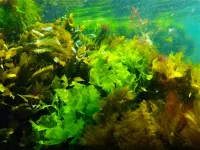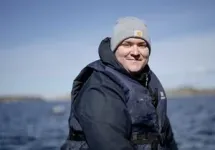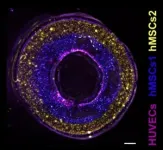(Press-News.org) The number of species of the green alga sea lettuce in the Baltic Sea region and Skagerak and is much larger than what was previously known. Researchers at the University of Gothenburg have surveyed 10,000 kilometres of coast and found twenty species of sea lettuce.
Green macroalgae of the genus Ulva, also known as sea lettuce, are almost ubiquitous in the wider Baltic Sea region and and can be found from the Atlantic waters all the way up to the Bay of Bothnia in the Baltic Sea. Sea lettuce reproduce easily and grow quickly, which makes it interesting for an expanding aquaculture industry. Research is ongoing both in Sweden and abroad for utilising sea lettuce in the food industry and for different biochemical applications.
There are multiple species, but until now it has not been known how many there are and previously only a handful had been identified.
Invasive species identified
“We have studied the biological diversity of the Baltic Sea, Kattegatt and Skagerak by taking a large number of samples from sea lettuce that we have then conducted DNA analysis of. We found 20 unique species and subspecies. Three of these are invasive species that have found their way here in various ways,” says Sophie Steinhagen, a researcher at Tjärnö Marine Laboratory.
The researchers also found completely new species of sea lettuce in Swedish waters that have not previously been described scientifically. Some of these appear to only grow in the Baltic Sea.
The importance of this survey is significant. Growing sea lettuce as a food source is a rapidly increasing industry, and foreign species risk being spread through simple ignorance. To maintain and protect valuable ecosystems along the coasts, it is important to know which species grow there and to not introduce new species that risk out competing the native species.
Grow the right species in the right place
“Our study shows that today’s method of identifying species, which is often done by looking at the appearance of green algae, is insufficient for identifying the distribution of the various species. We have not been able to see the real extent of the biological diversity,” says Steinhagen.
The inventory discovered many new species, information that can be valuable when cultivation of sea lettuces is initiated in new places along the coast. It is important to grow the right species at the right place to avoid the risk of impacting diversity.
“This new knowledge allows us to develop methods for maintaining the unique sea lettuce species along a specific coast. Our survey can also help when writing regulations related to invasive species that should not be used in aquaculture if it is to be sustainable,” says Steinhagen.
Facts about sea lettuce
Sea lettuce consists of many species of the green algae Ulva. In Sweden, sea lettuce grows on cliffs and rocks at the edge of water along the entire West Coast and in the Baltic Sea up to the Bay of Bothnia. Sea lettuce is very nutritional with relatively high protein content, healthy polyunsaturated fatty acids and dietary fibres. It also has valuable biochemical molecules. Research is ongoing both in Sweden and abroad for utilising sea lettuce in the food industry and for different biochemical applications.
END
Twenty species of sea lettuce found along the Baltic and Scandinavian coasts
2023-06-12
ELSE PRESS RELEASES FROM THIS DATE:
Cancer diagnoses dropped sharply in Alberta during COVID-19 response
2023-06-12
Pandemic restrictions corresponded with a significant drop in diagnoses of breast, colorectal and prostate cancers as well as melanoma, according to a new Alberta study published in CMAJ (Canadian Medical Association Journal) https://www.cmaj.ca/lookup/doi/10.1503/cmaj.221512.
"The sweeping and unprecedented measures enacted at the beginning of the COVID-19 pandemic in Alberta had an inevitable impact on cancer care," writes Dr. Darren Brenner, an epidemiologist in Calgary, Alberta, and associate professor at the University of Calgary's Cumming School of Medicine, with coauthors. "Even though treatment and urgent surgeries for cancers were prioritized ...
Canada’s carbon pricing poses a $256 billion financial risk for borrowers and banks
2023-06-12
By putting a price on the cost of carbon, the Government of Canada aims to curtail greenhouse gas (GHG) emissions, but it comes with an increased risk for financial lenders and borrowers with high carbon emissions.
In a first-of-its-kind study, University of Waterloo researchers analyzed the effects of Canada’s carbon price regime on the economy. The results indicate that as carbon costs rise, high-emitting carbon industries such as mining and energy are at the greatest risk of default, with total assets of $256 billion at risk of being lost and almost a quarter ...
NYU Abu Dhabi researchers uncover new insights into why individuals are affected differently by COVID-19 infection
2023-06-12
Abu Dhabi, UAE (June 12): A team of researchers at NYU Abu Dhabi, led by Associate Professor of Biology Youssef Idaghdour and working in collaboration with clinicians at several Abu Dhabi hospitals, investigated the association between microRNAs, a class of small RNA molecules that regulate genes, and COVID-19 severity among 259 unvaccinated COVID-19 patients living in Abu Dhabi. The team identified microRNAs that are associated with a weakened immune response and admission to ICU.
During this process, ...
Vaccine against deadly chytrid fungus primes frog microbiome for future exposure
2023-06-12
UNIVERSITY PARK, Pa. — A human or animal’s microbiome — the collection of often beneficial microorganisms, including as bacteria and fungi, that live on or within a host organism — can play an important role in the host’s overall immune response, but it is unclear how vaccines against harmful pathogens impact the microbiome. A new study led by researchers at Penn State found that a new vaccine against the deadly chytrid fungus in frogs can shift the composition of the microbiome, making frogs more resilient to future exposure to the ...
Should robots be given a human conscience?
2023-06-12
Modern-day society relies intrinsically on automated systems and artificial intelligence. It is embedded into our daily routines and shows no signs of slowing, in fact use of robotic and automated assistance is ever-increasing.
Such pervasive use of AI presents technologists and developers with two ethical dilemmas – how do we build robots that behave in line with our values and how to we stop them going rogue?
One author suggests that one option which is not explored enough is to code more humanity into robots, gifting robots with traits such as empathy and compassion.
Is ...
Research brings hope for early treatment of brain degeneration in ‘children of the night’
2023-06-12
Glasgow, UK: Xeroderma pigmentosum (XP) is a rare and devastating genetic disorder characterised by an inability to repair skin damage caused by ultraviolet (UV) light. As a result, patients with XP develop skin cancers, usually in childhood. Once diagnosed, they can be protected by avoiding sunlight (hence sometimes being called ‘children of the night’), wearing special clothing and sunglasses, and using sunscreen. But some will also develop neurodegenerative conditions such as hearing loss, loss of intellectual function, poor co-ordination and seizures. Finding out why this is, and which ...
Polygenic risk scores could improve colorectal cancer screening
2023-06-12
Glasgow, UK: Rates of colorectal cancer are high despite widespread adoption of screening programmes in many high-income European countries. Such programmes tend to use a one-size-fits-all approach where most people are screened starting from the same age, and no individual factors are considered in organised population screening. Now, based on one of the largest genomics studies on the topic to date, researchers from Finland have outlined how common genetic factors could be used to identify individuals at high risk of developing the disease and hence improve current colorectal screening strategies.
Max Tamlander, MD at the Institute ...
Results from first randomised controlled trial of genetic counselling for familial and inherited colorectal cancer show significant improvements in patient empowerment
2023-06-11
Glasgow, UK: Genetic counselling is essential when dealing with individuals who are affected by, or at risk of, inherited disease. Although it is known to be useful in helping patients cope with test results and deal with uncertainty, there have been very few randomised controlled trials (RCTs) of its effectiveness. Dr Andrada Ciuca, a post-doctoral researcher at Babes-Bolyai University, Cluj-Napoca, Romania, will tell the annual conference today (Sunday 11 June) that the results of the first RCT of genetic counselling in familial colorectal cancer (fCRC) show that it provided significant ...
Blood biomarkers plus genomics predict common disease risk more accurately than genomic information alone
2023-06-10
Glasgow, UK: Being to identify people at high risk of chronic disease means that they can be targeted with prevention measures before they become sick. Polygenic risk scores, where genomic information alone is used to assess the risk of developing diseases, have been receiving a lot of attention recently, but research to be presented at the annual conference of the European Society of Human Genetics today (Saturday 10 June) suggests that combining blood biomarkers with genomic information gives more accurate, cost-effective results.
Dr Jeffrey Barrett, Chief Scientific Officer, Nightingale Health, Helsinki, ...
The use of AI in eye scans helps improve diagnosis of inherited disease of the retina
2023-06-10
Glasgow, UK: Inherited retinal diseases (IRDs), single-gene disorders affecting the retina, are very difficult to diagnose since they are uncommon and involve changes in one of many candidate genes. Outside specialist centres, there are few experts who have adequate knowledge of these diseases, and this makes it difficult for patients to access proper testing and diagnosis. But now, researchers from the UK and Germany have used artificial intelligence (AI) to develop a system that they believe will enable more widespread provision of testing, together with improved efficiency.
Dr ...



